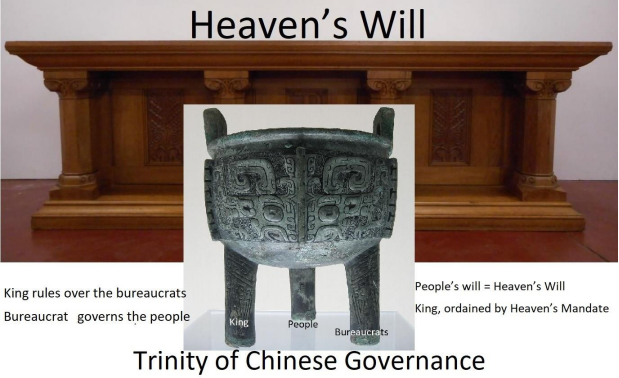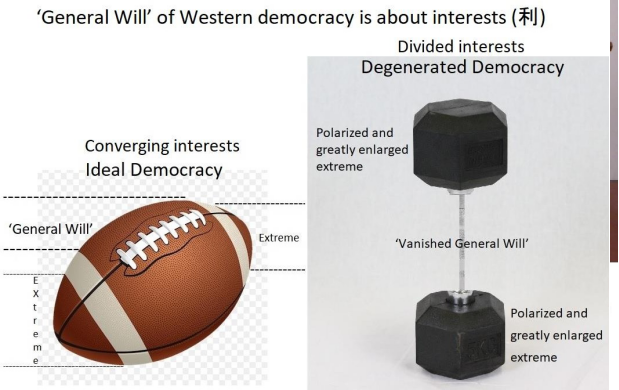-About the Western Democracy
Gong Tianren
The previous Chapter (Chapter 28) has provided some bases on the metaphysical differences between the two different political systems (the Western democracy and the Eastern Confucianism).
The detailed discussion on the Eastern Confucianism is discussed in the book (Bible of China Studies; US copyright #TX 8-685-690, collected by many Ivory League University Libraries, and its pdf is now available at https://tienzengong.files.wordpress.com/2018/03/bible-of-china-studies.pdf ). In summary, it has three key points.
One, the SOURCE of the legitimacy of the political power is from the MANDATE OF HEAVEN (Heaven’s Will).
Two, the manifestation of this legitimacy is the HEAVENLY MORALITY, imbedded in the conscience of every Chinese individual; that is, people’s will = Heaven’s Will.
Three, the operational mechanism is the ‘Trinity of Chinese Governance’, with the following circle, the 3 legs (citizens, King/central power, and bureaucrats) of the political cauldron:
{People’s will = Heaven’s Will} — > {King/Centre Government, ordained by Heaven’s Mandate, People’s will} —> {King/Centre Government rules over the bureaucrats} —> {Bureaucrats governs the people}
On the other hand, the Western democracy EXCLUDES any influence from the HEAVEN on two standpoints.
One, Thomas Paine wrote, “There never did, there never will, and there never can exist a parliament, or any description of men, or any generation of men, in any country, possessed of the right or the power of binding and controuling posterity to the ‘end of time,’ … The vanity and presumption of governing beyond the grave, is the most ridiculous and insolent of all tyrannies. (Rights of man, page 9)
Two, From John Locke (Two Treatises of Government) and Jean-Jacques Rousseau (The Social Contract), the key point is: exchanging (abandoning) the NATURE RIGHTS (morality based) with a civil contract (human ethics).
Thus, the Western democracy is based on the following three points.
One, the SOURCE of the legitimacy of the political power is from the General Will of its citizens. Two, the manifestation of this General Will is the human ethics (a social contract), not heavenly morality, the separation of the Church and State. That is, the Western democracy expels any transcendental MORALITY but is totally about human ethics.
Three, the operational mechanism is a voting system and a manmade governing system (such as the 3 branches system of the US), see Note 6.
From the phenomenology (external expressions of a system), the Western democracy encompasses many inequalities: the racial inequality, the economic (livelihood, health care, ) inequality (see note 3
in Chapter 26), justice inequality, etc.
Are these inequalities the direct consequences of the system, the manifestations of its essence? Or are they the foreign invaders which are unable to be eradicated by the system? To answer this question, we must revisit its metaphysical foundation.
For the Confucianism, it is based on the heavenly morality,
the 仁{= 人 (human) +
二 (two)}; that is, 仁is about the ‘Otherness-ism”, putting others first while annihilating the SELF. So, the key human right of Confucianism is the “right of life (survive) of others”. If all others’ lives are in danger, it is the shame of my life. If all others’ lives are in danger because of the acts of king (government), I (a self) will rise to rebel (even with the sacrifice of my own life). In Confucianism, the ‘right to rebel” preempts all other rights.
On the other hand, the Western democracy is based on exchanging the nature rights to a social contract. This exchanging process amplifies the Self-interests in all exchanges, and this leads to INDIVIDUALISM. This self-interest leads to competition. In all competitions, there are winners and losers, and thus the inequalities.
So, the key human right in the Western democracy is the RIGHT of doing the exchange, and this right is manifested as the right to VOTE. With this ‘right to vote’, all other rights (racial equality, economic equality, justice equality, etc.) are no longer as rights but are the awards/privileges of the competitions.
So, all the inequalities in the West are not foreign elements but are the direct consequences of this democracy system from its essence: via the right to vote and kills all the rights of equality in principle while they might still be preserved in some practices. The first amendment: freedom of speech is just a social contract. The right to protest (an extension of the freedom of speech) can never become the RIGHT of rebel.
By all means, I am not trying to judge which system is better here. All that I am trying to do is to show that political systems are all isomorphic to the physics system (the Physics – TOE), as the Political TOE. And that will be the major task in the next Chapter (Chapter 30). However, I should still describe those political systems as they are first.
As I have written an entire book on the Eastern Confucianism, I will use this chapter to describe the Western democracy system.
The phenomenology of the Western Democracy
In the previous Chapter (Chapter 28), I have described the Western democracy on it metaphysical level: Exchanging Nature Rights (Morality) with a social contract (human ethics).
This exchange assumes:
- that Human Nature (self-interest, individualism) is similar and will reach a General
- that the competitions (leaded by self-interest) will maximize the General Welfare for the entire population.
- that the human ethics (without the support of heavenly morality) can ensure the operations of the two assumptions
These 3 assumptions are interlinked. If any one of the three is wrong, the entire system collapses. These three principles above are implemented via a two-step system:
Step one (the metaphysical base): strip all human rights with one (right to vote); that is, putting
everyone on an equal footing. From this equal footing, everyone must compete, and the winner takes more.
Step two (the implementation): via differentiation and integration. The right to vote is differentiated to individual (1) which is infinitesimal, near zero (0) in practice in a society. That is, the political power can only be regained if those differentiated individual can be integrated. So, in practice, the political power in the West is not about the ‘right to vote’ but is all about the ways and the abilities of integration. So, this system immediately divides people into two classes:
- being differentiated (infinitesimal, near zero politicalpower),
- the integrators, the political
Integration needs an integrating machine, which costs a lot of money. That is, with money, one can become an integrator, the power holder. Without the money, one can only be integrated.
That is, the Western democracy is a legal term to divide people into two groups: the HAVE and the have- NOT.
Democracy = mercantilism
In essence, democracy via ‘right to vote’ is an inherent diverging power and the inherent driving force for all inequalities.
Furthermore, if there are more than one way of integration, the assumption 1 (reaching General Consensus) will eventually be wrong, and a greatly divided society will be the inevitable outcome, see the graph below.
So, the assumption of John Locke, Jean-Jacques Rousseau, and Thomas Paine that a human ethics-based system (without the backbone of heavenly morality) can lead to General consensus and Common Welfare is wrong, both on the metaphysical level and on the implementation realities. The fact is that
this Western democracy will inevitably decay into extremes in principle.
A theoretical analysis
Without the backbone of Heavenly morality, all social contracts will inevitably decay into extreme contradictory extremes.
With upholding the “right to vote” as the preempting right, it will inevitably lead to all kinds of inequalities, as the true Nature human Rights {right to live (health care, job, etc.), right to no fear of unjust killing (by police, etc.), etc.} becomes privileges (the spoils of the competitions).
Yet, some particular political structures (such as the American one, with three branches) can further amplify the two processes (diverging on general consensus and increasing the inequalities) above.
The US system of three branches is claimed to be balanced and mutually checked. Are these three branches balanced with equal power (1/3 for each)?
In principle, the Congress has the power of creating (legislation) the laws (the social contracts). The President (executive) can only execute the legislated laws.
The Supreme Court is to settle the dispute of any issue in the country, by interpreting the laws.
Seemingly, this is a system of truly dividing the three distinguishing powers (functions) of a nation to three branches, in principle.
Although there is a checking power implemented in Congress to check the other two branches with the power of impeachment, there is not a single success case in the past 240 years in the US history in practice. In a dynamic equation, if variable X should drive a consequence Y; yet, in real measurement, Y was never detected in Z amount of time. Then, the power (effectiveness) of X can be easily calculated and an upper limit can be easily established. In this impeachment case, the real measurement is ZERO in 240 years; that is, its upper limit is (1/240) % < 0.4% chance to be effective in the future.
For the most recent case, even if Donald Trump were 100% guilty as charged, he will not be convicted in practice by any means. Can ever a president or supreme court justice be removed from office (not just in the 240 years) in a practical way? The simple arithmetic analysis shows that that chance is not good.
First, the checking (removing) process on other branches is DIVIDED into two steps (impeach by the House and convict by the Senate), just and fair in principle but could be totally unjust and unfair in practice.
A rascal President or Supreme Court Justice will not be impeached if he is protected by the House. If he is impeached by the House, he can still be protected by the Senate. That is, any rascal President or Justice can dodge the fate of being removed by playing the politics, courting the House or the Senate. The historical record has proved this scenario. In the historical record, the TRUE checking power is just a joke, not a reality thus far, and most likely will stay as a joke in the long, long future.
原文下载:done2-TOE-politics
中译:关于西方民主
—-龚天任
前一章(第28章)对两种不同政治制度(西方民主和东方儒学)的形而上学差异提供了一些基础。
关于东方儒学的详细讨论在《中国圣仁之学》:
(Bible of China Studies;US copyright#TX 8-685-690)一书中进行了讨论,该书由许多常春藤联盟大学图书馆收集,其pdf文件现在可在https://tienzengong.files.wordpress.com/2018/03/bible-of-china-studies.pdf).
总而言之,它有三个要点。
其一,政治权力的合法性来源于天命(天命)。
第二,这种合法性的表现是根植于每个中国人良知中的天道,即人民的意志=天意。
第三,运行机制是“中国治理三位一体”,有以下三个圈,即政治鼎立的三条腿(公民、国君/中央权力、官府/官僚):
{人民的意志=天意}—>{国君/中央政府,天命所定,人民的意志
体现}—>{国王/中央政府统治官僚}—>{官僚统治人民}
另一方面,西方民主在两个方面排除了来自天国的任何影响。
托马斯·潘恩写道:“在任何国家,从来没有,也永远不会,也永远不可能存在一个议会,或任何关于人的描述,或任何一代人,拥有约束和控制后代到‘时间尽头’的权利或权力。。。虚荣和自以为是的超越的统治,是所有暴政中最可笑和最傲慢的
第二,从洛克(两部政府论著)和卢梭(社会契约论)的观点来看,关键是:用民事契约(人类伦理)交换(放弃)自然权利(道德基础)。
因此,西方的民主是建立在以下三点上的。
其一,政治权力的合法性来源于公民的普遍意志。
二是这种普遍意志的表现形式是人的伦理(社会契约),而不是天道,是政教分离。也就是说,西方民主排斥任何先验道德,而完全是关于人类伦理的。
三是运行机制为投票制和人为治理制(如美国的三分制),见注6。
从现象学(制度的外在表现形式)来看,西方民主包含许多不平等:种族不平等、经济(生计、医疗)不平等(见注3)
在第26章),正义不平等等。
这些不平等是制度的直接后果,是其本质的表现吗?或者说他们是制度无法消灭的外来侵略者?要回答这个问题,我们必须重新审视它的形而上学基础。
对儒家来说,它是建立在天道之上的,即人+
二(仁)};也就是说,仁是关于“他者主义”,把他人放在首位,同时消灭自我。因此,儒家的核心人权是“他人的生存权”。如果其他人的生命都处于危险之中,那就是我生命的耻辱。如果所有其他人的生命都因为国王(政府)的行为而处于危险之中,我(一个自我)将奋起反抗(即使牺牲自己的生命)。在儒家思想中,“反抗的权利”优先于所有其他权利。
另一方面,西方的民主是以自然权利与社会契约的交换为基础的。这种交换过程放大了所有交换中的自我利益,导致了个人主义。这种私利导致竞争。在所有的比赛中,都有赢家和输家,因此存在着不平等。
因此,西方民主国家的核心人权是进行交换的权利,这种权利表现为选举权。有了这一“投票权”,所有其他权利(种族平等、经济平等、司法平等等)不再是权利,而是竞赛的奖励/特权。
因此,西方所有的不平等都不是外来因素,而是这种民主制度从本质上的直接后果:通过选举权,原则上扼杀了所有平等的权利,而在某些实践中,这些权利可能仍然得到保留。第一修正案:言论自由只是一种社会契约。抗议权(言论自由的延伸)永远不能成为反叛者的权利。
无论如何,我并不是在试图判断这里哪个系统更好。我所要做的就是证明政治系统都是与物理系统统一理论(物理-Toe)同构的,就像政治统一理论(Toe)一样。这将是下一章(第30章)的主要任务。不过,我还是应该先说说这些政治制度主要特征。
我写了一整本关于东方儒家思想的书.
https://tienzengong.files.wordpress.com/2018/03/bible-of-china-studies.pdf ).
I 西方民主现象学
在前一章(第28章)的西方民主现象学中,我从形而上的层面描述了西方民主: 用社会契约(人类伦理学)交换自然权利(道德)。这种交换假设: 人类的本性(个人利益、个人主义)是相似的,并将达到竞争(以个人利益为主导)将使全体人民的总体福利最大化的一般性。人类伦理学(没有天道的支持)能够确保这三个假设相互关联的两个假设的运作。如果其中任何一个错了,整个系统就会崩溃。
上述三项原则是通过两个步骤来实现的: 第一步(形而上学的基础) : 用一个步骤(投票权)剥夺所有人权,即将所有人置于平等的地位。在平等的基础上,每个人都必须竞争,胜者得到更多。第二步(实现) : 通过差异化和集成。选举权与个人(1)有区别,个人(1)是无穷小的,在社会实践中接近于零(0)。也就是说,只有这些差异化的个体能够被整合,才能重新获得政治权力。因此,在实践中,西方的政治权力不是关于“选举权” ,而是关于融合的方式和能力。因此,这个系统立即将人们分为两类: 被区分(无穷小,接近零的政治权力) ,集成者,政治一体化需要一个集成机器,这需要很多钱。也就是说,有了钱,一个人可以成为一个集成者,一个权力持有者。没有钱,一个人只能成为沉默的大多数。也就是说,西方的民主是一个法律术语,把人们分为两类: 有权的和没有的人。
民主 = 重商主义
本质上,通过选举权实现的民主是一种内在的分歧力量,是一切不平等的内在驱动力。此外,如果有一种以上的整合方式,假设1(达成普遍共识)最终将是错误的,一个大分裂的社会将是不可避免的结果,见下图。因此,john locke,让-雅克·卢梭和 thomas paine 关于一个以人类伦理为基础的系统(没有天堂道德的支柱)可以导致普遍共识和共同福利的假设是错误的,无论是在形而上学的层面上还是在实施的现实中。
事实上,西方的民主制度,在原则上将不可避免地走向极端。如果没有天道的支柱作为理论分析,所有的社会契约都将不可避免地走向极端矛盾的极端。坚持“选举权”作为优先权,必然导致各种不平等,因为真正的自然人权(生存权(医疗保健、工作等)、不怕不公正杀害的权利(警察等)等)成为特权(竞赛的战利品)。然而,一些特定的政治结构(如美国的政治结构,有三个分支)可以进一步放大上述两个过程(在普遍共识上存在分歧,并加剧了不平等)。美国的三个分支系统被宣称是平衡和相互制约的。这三个分支是平衡的吗(每个分支1/3) ?原则上,国会有权制定(立法)法律(社会契约)。总统(行政部门)只能执行法律。最高法院将通过解释法律来解决国内的任何争端。从表面上看,这是一个原则上将一个国家的三大区别力量(职能)真正分为三个部门的体系。
虽然国会实行了制约权,以弹劾权制约其他两个分支,但在过去240年的美国历史实践中,没有一个成功的案例。在一个动态方程中,如果变量 x 应该驱动一个结果 y; 然而,在实际测量中,y 在 z 的时间量中从未被检测到。然后,x 的功率(有效性)可以很容易地计算和一个上限可以很容易地确定。在这个弹劾案中,240年内实际测量值为零,即其未来有效的上限为(1/240)% < 0.4% 。
在最近的案子中,即使 Donald Trump 被指控100% 有罪,他也不会被判有罪。一位总统或最高法院大法官能否以实际的方式被免职?就仅仅在240年内的历史而言,简单的算术分析表明,这种机会是不大的 。首先,对其他部门的审查(撤销)程序分为两个步骤(众议院弹劾、参议院定罪) ,原则上公正、公平,但在实践中可能完全不公正、不公平。一个无赖总统或最高法院法官,如果受到众议院的保护,就不会被弹劾。如果他被众议院弹劾,他仍然可以得到参议院的保护。也就是说,任何无赖总统或法官都可以通过玩弄政治,讨好众议院或参议院,来避免被免职的命运。历史记录已经证明了这一点。
根据历史记录,真正的制衡力量只是一个笑话,到目前为止还不是现实,而且很可能在漫长的未来,只能是一个笑话。
(后面从略,如果想进一步了解,请看原文:下载:done2-TOE-politics )
编译 李小坚


